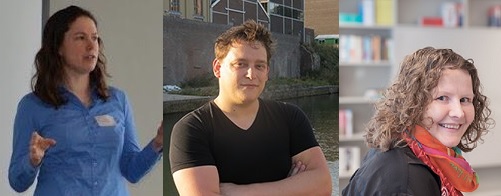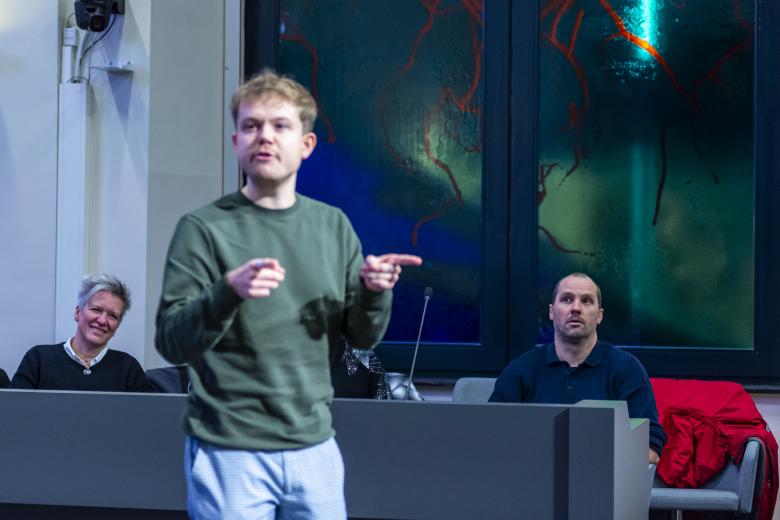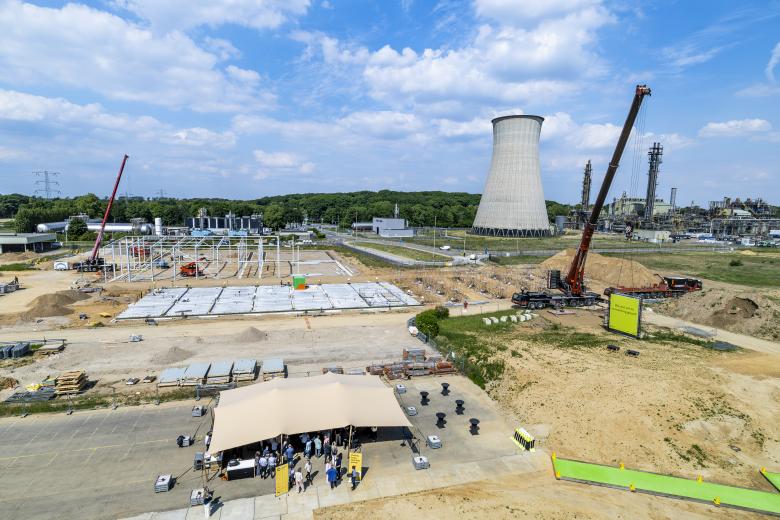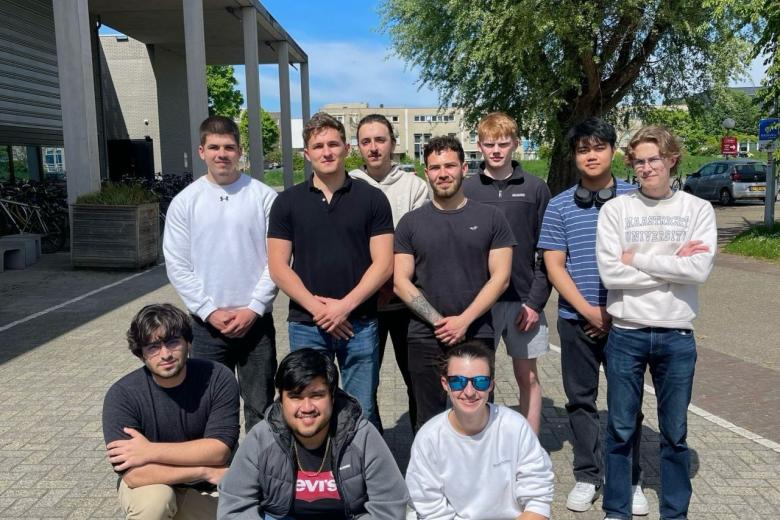1 study & 3 jobs
Three Artificial Intelligence alumni talk about their work. Marloes van Eijk is a data scientist/advisor at the Public Prosecution Service, Gijs-Jan Roelofs is a freelance consultant and Inge Lemmens is chief technology officer at PNA Group.

From left to right: Marloes van Eijk, Gijs-Jan Roelofs, Inge Lemmens.
Gijs-Jan Roelofs
What is it that you do exactly?
The UK company Goldhawk Interactive is working on a new computer game, called Xenonauts 2. As one of their self-employed workers for the past four-and-a-half years, I am responsible for solving those tricky technical issues that arise during development. This might involve creating algorithms for the automatic rendering of graphics such as trees or shadows in the game world, but also using data mining to analyse at which stages players drop out of the game. While studying for my bachelor's at UM, I and others founded CodePoKE, a company that offered students the opportunity to set up and market their own projects. This eventually grew into my own software development consultancy business specialised in academic and game AI consultation and development.
How does a day at work look like for you?
I mainly use Skype to stay in touch with Goldhawk and only visit London for a few days every few months. Each working day, I have a Skype meeting with the artists who work on the game and another one with the technical team. I spend the rest of the day programming at my desk, pausing for an occasional walk to gather my thoughts. While many programmers instinctively start with an assignment straight away, it is sometimes better to consider carefully what you want to do beforehand. I am a strong believer in supporting the next generation of students, which is why my door has always been open for DKE students who need help with projects and are looking for ideas about what they might be doing after their studies. I myself benefited from the knowledge of senior students during my time at UM.
Who are your counterparts/stakeholders?
They are the technicians and artists I manage at Goldhawk and, obviously, the project leader of the entire project in London.
What’s your favourite aspect of the job?
I face new challenges every day. The constant requirement to shape or use the latest technologies keeps my job fun. I also like that it involves aspects of psychology, creativity, maths and other disciplines. In that sense, it reminds me of a few projects I worked on during my studies that first made me realise that maths did not always have to be abstract.
Where do you see yourself in 5 years?
It could go several ways. Scientific research is one area that appeals to me. On the other hand, Goldhawk has been granting me an increasing amount of autonomy and even a budget for my own projects, so that interests me as well. Furthermore, my network in the United States has opened up game development consultancy opportunities. It all depends on where the most appealing project is. There is currently such a demand for highly qualified staff in my sector that I can afford to pick and choose at my leisure.
Why did you start the Master in Artificial Intelligence at Maastricht University?
Much of my time during my bachelor's in Knowledge Engineering was already taken up by CodePoKE, which was something I wanted to take further. Fortunately, I had a good relationship with my professors, who allowed me the freedom to pursue my interests further. At the time, there were few job opportunities for AI personnel in the area, so I felt that exciting prospects abroad would eventually come my way naturally. I have never regretted it.
What advice would you give current students and recent alumni of the Master in Artificial Intelligence?
Be aware of what you’re worth. You are at a point in your life that affords you plenty of time to think about what you really want, so take your time and always negotiate a good deal. In my own experience, what you yourself regard as the upper limit in terms of salary or benefits often is not even a starting point for the other party. Try to realise the full potential of your academic intellect, so that you can become more than just a programmer. At the same time, do not forget to enjoy student life – invest time in developing your social skills rather than in a simple programming job on the side. Many people mistakenly believe that programmers are entirely desk-bound, whereas social and communication skills are what usually makes or breaks a team. Above all, remain ethically aware in your work! In our sector, you may be asked to develop drones with automated software for use by the military, or software designed to make choices for insurance companies on which individual lives depend. If we ever reach the stage of a totalitarian regime, it will be because programmers made it possible. We should remain fully aware of that fact.
If you would have another chance, what would you do differently as a student?
There were times when I wrote my theses when I bit off more than I could chew. Consequently, the end result was not always what I had intended. Keep a tight focus and limit the scope of your research.
Inge Lemmens
What is it that you do exactly?
I have been working at PNA Group in Heerlen for 15 years. We help clients to reason with their data, so we identify and structure the knowledge relating to the data. This process provides them with insight, helps them to be decisive and ultimately saves them money. As an Executive Consultant, I work on location with clients on projects involving tasks such as data modelling. For example, I spent two days a week at ABN Amro in Amsterdam since 2015. In addition, I have completed several projects for the European Space Agency, which included working in both Noordwijk and Italy. I have also served as Chief Technology Officer for the past few years, partly following in the footsteps of the founder of PNA Group, Prof. Sjir Nijssen. He is the founder of cogNIAM, the backbone of our company. Although it would be impossible to replace him, I have to ensure that the method continues to be developed based on new techniques and trends as well as market needs.
What does a day at work look like for you?
In the morning, I usually travel to clients, nowadays mainly in the Randstad and in Limburg. If I am there for a few days, I stay at the same hotel with other colleagues so we can catch up in the evening. On other days, I work with my colleagues in Heerlen.
Who are your counterparts/stakeholders?
First, our clients, some of whom I have been working with for years. They range from directors to analysts. Second, my close colleagues and sometimes also potential collaboration partners.
What’s your favourite aspect of the job?
The variety. I truly believe in our method, cogNIAM, and I love the interaction with clients. As a result, I might be discussing financial products one day and talk about satellites the next. I learn something from every assignment. In that respect, I also see that what I learnt at university hasn't changed fundamentally. During my student days, deep learning was called 'neural networking'. While computers have more processing power now and the internet didn't exist back then, the essential idea is basically the same.
Where do you see yourself in 5 years?
Time goes by so quickly: I work on really interesting projects with great clients and before I know it, another year has come and gone. I'll keep doing consultancy in any case because I enjoy it so much. Perhaps I'll add in some more management activities in future.
Why did you take the Knowledge Engineering degree programme at Maastricht University?
I wanted to study computer science, but not the purely theoretical version that was offered in Belgium. Through the newly established transnational University of Limburg, I was able to enrol in Knowledge Engineering, which was a completely new programme at the time. I was in the first cohort; we graduated as a group of four. For the first two years, I lived in Diepenbeek, after which I travelled back and forth to Maastricht by car for two years. The combination of theory and practice was appealing to me. I remember the project assignments for the Maastricht fire brigade and ENCI. We saw the results of putting theory into practice.
It was a bit of a culture shock moving from Belgium to the Netherlands. There were professors who said: 'Just call me Erik'. If you are having one-on-one classes, which I regularly did, it starts to feel more natural over time. But, I can't imagine ever having addressed a professor on a first-name basis back then. I still get a lot of use out of my training, even though it was a long time ago. The logical, causal thinking that I learnt at university definitely continues to benefit me today.
What advice would you give current students and recent alumni of the master's in Artificial Intelligence?
We have a few students from UM's current Knowledge Engineering programme at PNA and I would tell them: don't go for your dream job straight away. Take your time to figure out what you want first and don't assume that you already know when you graduate. There is so much that you can do with this programme. So try out different things and be open to new possibilities.
If you had another chance, what would you do differently as a student?
In terms of my studies, I wouldn't do anything differently. The only thing coming to mind is that it might have been better with just four people in my cohort for us to be a bit more patient with one another sometimes. When the Knowledge Engineering programme recently celebrated its 25th anniversary at UM, I had the chance to reconnect with some of the students from my year and the years right after me. We've kept in touch regularly since then. All of them have either become self-employed or risen to a position of responsibility.
Study Artificial Intelligence?
Interested in this study programme? Visit the page of the master's programme Artificial Intelligence.
Also read
-
More than another ‘to-do’: how the UTQ helped me rethink my teaching
At Maastricht University, the University Teaching Qualification (UTQ) is a professional development programme designed to strengthen teaching and learning. It supports teachers in developing core teaching competencies through a combination of workshops, peer learning, on-the-job experience, and...

-
Brightlands Circular Space focuses on integrated approach to entire plastic value chain
Construction has officially started today in Limburg of Brightlands Circular Space, a demonstration facility that accelerates the transition to circular plastics.

-
MaaSec – The Netherlands' Only Active ACM Student Chapter captures the flag
In January, a group of Computer Science students at Maastricht University launched MaaSec, currently the only active ACM student chapter in the Netherlands. And in just a few months, they've already made a name for themselves; especially in the world of Capture the Flag (CTF) competitions.
